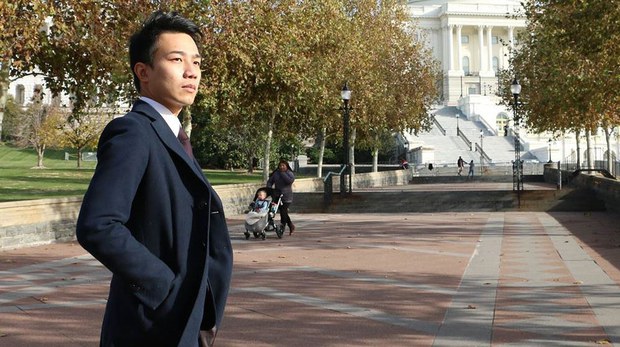British government urged to protect Hong Kong activists
Share

“I usually take an Air Tag [tracker device] with me to let trusted people know whether I’m safe,” says Finn Lau, whose name appears on a wanted list of eight prominent overseas activists issued by Hong Kong’s national security police.
Calls are growing for the British government to take action to protect Hong Kongers both in the United Kingdom and in their city of origin, following the arrest of 20 British visa applicants last week.
Exiled activists, some of whom have arrest warrants and bounties on their heads, have spoken out in recent interviews over ongoing violent attacks on them by supporters or agents of the Chinese state.
“It is not safe to go out in the U.K.,” Finn Lau, whose name appears on a wanted list of eight prominent overseas activists issued by Hong Kong’s national security police earlier this year, and who was attacked near his London home in 2020.
“I usually take an Air Tag [tracker device] with me to let trusted people know whether I’m safe,” he said, adding that he also carries a strobe torch and a rape alarm as a deterrent to potential attackers.
Since Beijing imposed a national security law banning public opposition and dissent on the city, blaming “hostile foreign forces” for the protests, hundreds of thousands have left Hong Kong, at least 144,000 of them via the British National Overseas visa scheme, which offers a pathway to citizenship to holders of the British National Overseas passport.
China has hit out at the visa program as “interference in its internal affairs.”
Many Hong Kongers in the United Kingdom have spoken recently about threats to their personal safety and acts of violence by Beijing supporters and officials alike.
Lau called on local police forces to liaise more with local exile groups to step up measures to protect Hong Kongers.
“Police in different regions in the U.K. could hold forums or closed-door meetings to communicate with local British Hong Kong organizations, to learn about the various attacks or infiltration, including personal experiences, which would help them formulate a policy to improve Britain’s serious infiltration problem,” Lau said.
Targeted for withdrawing pensions
Hong Kong Watch, a London-based rights group, said the authorities are also targeting people even before they’re able to leave for overseas – when they try to cash out of their pensions.
The city’s Independent Commission Against Corruption said last week it had arrested 20 individuals related to Hong Kongers who were seeking to withdraw their Mandatory Pension Fund from Hong Kong, claiming they had said they were moving to mainland China.
It is possible that they were trying to get around an effective freeze on emigrating Hong Kongers cashing out their pension pots from the compulsory scheme, which is administered by a number of banks and insurance companies.
“This is a direct retaliatory action by the Chinese Government against the introduction of the British National Overseas Visa and other lifeboat schemes, and is a direct breach of Hong Kong’s Basic Law which guarantees freedom of movement of capital in and out of the city,” the group’s Director of Policy and Advocacy Sam Goodman said in a statement on Oct. 13.
“These arrests bring back into focus the ongoing scandal of the Hong Kong Government and Mandatory Provident Fund providers such as HSBC, Manulife, and Sun Life, denying tens of thousands of Hong Kongers access to their pension savings,” Goodman said.
Former pro-democracy district councilor Daniel Kwok, who now lives in the United Kingdom, said he has been followed, and had his photo taken by unknown individuals while helping organize public activities related to Hong Kong.
He said he still feels safe there, however.
“Will our human rights-related activities or Hong Kong-related activities be monitored by the Chinese Communist Party? This is inevitable in cities in Taiwan, Japan, Europe, the United States, Canada and the United Kingdom,” he said.
“But for ordinary Hong Kong people who emigrate to the United Kingdom, the risk is not so high compared with for those who take part in social and political activism, so they don’t need to worry too much,” Kwok said. “Overall, it’s relatively safe.”
‘Ghosts’
In an Oct. 17 report, The Guardian newspaper cited several emigre Hong Kongers in the country as saying that they feel unsafe, and are constantly on the watch for “ghosts” – people seeking to infiltrate their groups and activities to funnel information back to Beijing.
The Hong Kongers quoted said they felt “ignored and unprotected” by the British government.
A former 2019 protester who gave only the pseudonym Rumi told The Guardian: “I am exhausted. I’ve lived with these online personal attacks for the past two years. My girlfriend left me and my family is angry about me. But I just want to tell the truth and get justice.”
He said police back home are still harassing his parents, much like their questioning and raids on the homes of Hong Kong-based relatives of the eight wanted activists.
“People wait outside my parent’s home [in Hong Kong] and watch them, sometimes even knocking on their door to threaten them. ‘Ask your son to watch out for what he said. We know who you are and where you live,’ one said to them,” the paper quoted him as saying.
Translated by Luisetta Mudie. Edited by Malcolm Foster.







